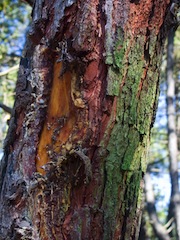Pycnogenol, a French Health Cocktail

Other names:
- Oligomeric Proanthocyanidins Complex
- OPC
- Proanthocyanidins (Strictly speaking, this is just one component of 40 found in Pycnogenol)
Nutrient Family :
- Phytonutrients/Phytochemicals
> Sub-Group: Polyphenols - Flavonoids
The name “Pycnogenol” was coined by French researcher, Dr Jacques Mesquelier, in the early 1950s.
Pycnogenol is a registered trademark for the flavonoid supplement produced from a special type of maritime pine bark found in France and in the Quebec province of Canada.
Its “real” name is Oligomeric Proanthocyanidins Complex or “OPC” for short. Its long name is quite the obvious reason why Pycnogenol became its adopted or the generic name.
Pycnogenol is a supplement made of up to 40 different types of flavonoids extracted from this pine bark. However, the name is also use for same substances extracted from grape seeds, grape skins or cranberries.
While it’s made up of 40 different flavonoids, most notably amongst them are:
- Catechins
- Flavons
- Proanthocynidin (65-75%)
o Proanthocynidin is said to be 50 times more potent than Vitamin E as an antioxidant
And, Pycnogenol (the 40 flavonoids working as a group) is said to be 50 times more potent than Vitamin C as an antioxidant, and being a Network Booster, it recycles Vitamin C.
Pycnogenol's Workings
Fat or Water Soluble Antioxidant:
- Water Soluble
Other functions besides being an antioxidant :
- Reinforces capillary walls which in turns improve micro-circulation
- Protect against platelet aggregation, reducing risks of blood clots that can lead to stroke and heart attack.
- Bolster the immune system by recycling Vitamin C, as well as, protecting the macrophages (a type of white blood cells used by body as an immune defence) from free radical damages.
- Anti-inflammatory
Where Is Pycnogenol Found Naturally?
Pycnogenol/Oligomeric Proanthocyanidins Complex (OPCs) are sourced from plants only, typically:
- Maritime pine bark
- Grape Seeds
- Grape Skins
- Cranberries
- Peanut Skin
- Witch Hazel Bark
Examples of food sources:
- Maritime pine bark
- Grapes
- Cranberries
- Peanuts
- Witch Hazel Bark
Health Benefits of Pycnogenol
Examples of health benefits of Pycnogenol/Oligomeric Proanthocyanidins Complex (OPC):
- Neutralizing Free radicals to protect cells
- Regulate the Immune System
- Blood Pressure – both High and Low Blood Pressure
- Platelet Aggregation
- Atherosclerosis
- Chronic Fatigue Syndrome (CFS)
- Protection against UV and reduce damages of sun spots
- Treating or preventing chronic venous insufficiency (CVI)/swollen capillary - which can cause edema (fluid retention), weakness in capillary, legs swelling, varicose veins, itching, skin ulcers, easy bruising
- Attention Deficit Hyperactivity Disorder (ADHD) – improves blood flow to brain and thereby, improves concentration/focus
- Diabetes, and Diabetic microangiopathy (disease of small veins related to diabetes)
- Cramps – as it aids circulatory issues – including menstrual cramps
- Erectile dysfunction (ED) (taken with L-Arginine)
- Gingivitis
- Slow aging process
- Improve endurance
Possible Interactions
Most publications state that there are no serious side effects from taking Pycnogenol.
Do you have a PASSION you want to share with the world??? What better exposure than the INTERNET?!!!
Want to consider?
Well, you will need a place to "host" (place) your site, then the tools to build, run as well as track the performance of your Masterpiece!
OR, if you already have a site, but find that you are paying too much for tools and apps to run and track your site ...
Here's an All-in-One Solution for you! Hosting, as well as Tools to build, run and track!
